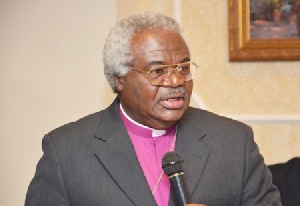The Right Reverend Professor Emmanuel Martey, the immediate past Moderator of the Presbyterian Church, has urged Ghanaians to prioritise the strict enforcement and compliance of the laws of the land towards building a strong and prosperous nation.
Those in leadership positions, he said, must set the pace for the citizenry to emulate; explaining that when laws were not enforced they would become impotent while applying force without laws would result in anarchy.
Prof Martey gave the advice at a roundtable discussion, organised by the Institute of Economic Affairs (IEA), a policy think tank, to review the 2017 Presidential Transition Act (PTA) in Accra, on the theme: ‘‘Strengthening Presidential Transitions in Ghana’’.
He emphasised that the country would only achieve accelerated sustainable development when the citizenry respects the laws.
Commenting on lapses identified in the implementation of the PTA, the Reverend Professor observed that successive governments had failed to abide by some of the provisions.
He said although the Presidential Transition Act 2012, (Act 845) stipulated that 30 days before the conduct of the general election, the outgoing government must submit the handing over notes to the Administrator-General’s Office, successive governments had failed to comply.
This negative practice, Prof Martey advised, should not be repeated in the future.
Prof. Martey also expressed misgivings over the employment of people on the eve of the previous government’s departure, saying while those appointments were being made; some workers were not receiving their salaries. “So what is the intention of bringing in more labour force at the last-minute?” he asked.
The roundtable discussion brought together various stakeholders, including representatives of political parties, civil society organisations and donor partners, who dispassionately discussed the shortcomings in the Transition Law.
The meeting discussed also proposed amendments to the Law in order to strengthen Ghana’s democratic credentials.
Some participants argued that the State’s provision of accommodation and offices for former presidents, as part of their retirement remuneration, was not sustainable and should be scrapped so that it would not drain the public purse.
They suggested that Parliament review the law that mandated government officials to purchase their vehicles after using them for more than two years.
They also suggested that the Administrator-General’s Office be well resourced in order to perform its mandate of managing State assets efficiently.
General News of Friday, 17 March 2017
Source: GNA













